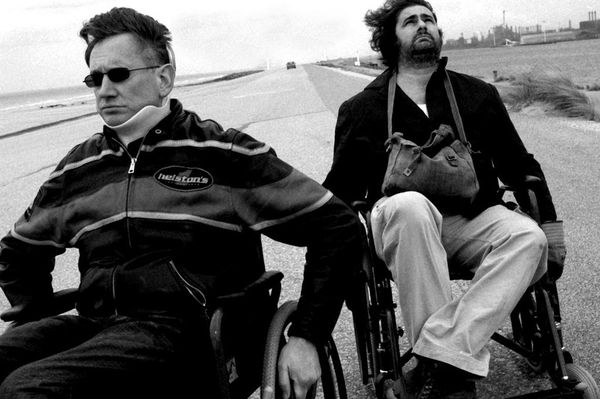Eye For Film >> Movies >> Aaltra (2004) Film Review

Like film reels as well as like life itself, roads can take people on wild detours and unexpected digressions before winding up at an arbitrary endpoint - and so the road movie has always been a winning cinematic genre, where the accumulated details of the journey are every bit as important as the final destination. In the road movie, viewers expect a bit of deviation from the norm, expect to travel off the beaten track as much as on. It is a genre where a certain amount of eccentricity comes fitted as standard - but even so, the Belgian road movie Aaltra features just about the oddest mode of trans-national conveyance since a 73-year-old drove across America on a lawnmower in David Lynch's The Straight Story (1999). For the bumpy ride that Aaltra offers, there are simply no seatbelts to fasten.
Ben (Benoît Delépine) is a disgruntled commuter, more interested in professional motocross than in getting his lonely wife (Isabelle Delépine) pregnant. Gus (Gustave de Kervern) is a lazy farmhand. Both are disgruntled, selfish, hopeless, petty, rude and barely likeable - and they also just happen to be next door neighbours, locked in a seemingly endless feud of minor disagreements and escalating mean-spiritedness.

One day, their tit-for-tat rivalry leads to a violent altercation, in which both men are accidentally crushed by Gus' tractor, and they find themselves side by side in hospital beds, completely paralysed from the waist down. Abandoned and alone, each man sets out separately on a journey across Northern Europe - Ben hoping to catch some motocross events and Gus seeking compensation for his injuries from the tractor company Aaltra, based in Finland. Yet their crippling disability keeps bringing the pair together and soon they have become partners in wheelchair crime as they make their way to Aaltra and an unexpected double punchline.
After Ben and Gus have been confronted in hospital with the permanence of their condition and the untold difficulties it will bring to their lives, for a brief moment either man is shown quietly weeping to himself in bed. It is a sequence that reveals, through contrast, the essential style of Aaltra. For these are the only close-ups to be found in the entire film, and they are also, quite simply, the only two shots that in any way invite our sympathies for Ben and Gus. Every other crisp, black-and-white image has been captured by cinematographer Hugues Poulain in long shot, maintaining a cool, flat distance that excludes sentiment, or easy identification. Even the accident itself is presented with an oblique matter-of-factness that makes it seem no more significant than anything else which befalls the duo.
And there's the rub. The unwritten laws of genre would have it that cinematic disability is somehow as ennobling as it is life changing, and that the principal players in a road movie should undergo a transformative rite of passage. Yet in Aaltra, these laws go right out the window. Ben and Gus were arseholes before their accident and remain arseholes after it and their journey is not towards personal improvement, redemption or the overcoming of impossible odds, but rather it takes them merely to a place where they seem always to have belonged.
Some of the people that they encounter in their travels, including the racist motocross fan, played with typically reactionary relish by Benoît Poelvoorde (Man Bites Dog), respond with ignorance, indifference or sickening abuse to their wheelchair-user status; but the fact remains that Ben and Gus take full, manipulative advantage of anyone who makes the mistake of showing them some kindness. As one of their victims (Jason Flemyng) puts it after Ben has made off with his motorbike: "It's people like you that give people in fucking wheelchairs a bad name." If genre dictates that we should like Ben and Gus, the film does its best to dissuade us of this predisposition, exposing along the way our own prejudices about disability.
Written and directed by its two stars, Belgian stand-ups Gustave de Kervern and Benoît Delépine, and seemingly named in such a way as to ensure its place at the top of any film database, Aaltra is a celluloid tribute to the deadpan style of Finnish director Aki Kaurismäki (Ariel, Leningrad Cowboys Go America, The Loser Trilogy), culminating in a brilliant cameo from the man himself. Grim, bleak, misanthropic, confronting and, of course, uproariously funny from beginning to end, Aaltra is a must-see for those who like their comedy Jim Jarmusch dry, rather than Farrelly Brothers broad.
Reviewed on: 07 May 2007

















